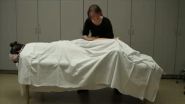(Press-News.org) New Rochelle, NY, April 17, 2014—U.S. military personnel who served in Iraq and Afghanistan and suffered "blast plus impact" concussive traumatic brain injury (TBI) were compared to military personnel without TBI who were evacuated for other medical reasons. Differences in measures of overall disability, cognitive function, post-traumatic stress, and depression 6-12 months after injury are reported in an article in Journal of Neurotrauma, a peer-reviewed journal from Mary Ann Liebert, Inc., publishers. The article is available free on the Journal of Neurotrauma website at http://www.liebertpub.com/neu.
Christine MacDonald, PhD, Ann Johnson, Elliot Nelson, MD, Nicole Werner, PhD, and David Brody, MD, PhD, Washington University School of Medicine (St. Louis, MO), and Col. Raymond Fang, MD and Col. (ret) Stephen Flaherty, MD, Landstuhl Regional Medical Center (Germany), found that overall disability among the study participants recovering from concussive TBI was surprisingly high. The authors explore the possible factors related to differences in outcomes between the two groups in the article "Functional Status after Blast-Plus-Impact Complex Concussive Traumatic Brain Injury in Evacuated United States Military Personnel".
John T. Povlishock, PhD, Editor-in-Chief of Journal of Neurotrauma and Professor, Medical College of Virginia Campus of Virginia Commonwealth University, Richmond, notes that "This is an intriguing study conducted in a relatively unique cohort of military patients who sustained blast plus other forms of traumatic brain injury. The finding in this patient population of sustained morbidity at 6 and 12 months post-injury, together with a dramatically increased incidence of post-traumatic stress disorders, is striking and must be considered as we move forward in our evaluation of blast-injured military personnel."
Dr. Povlishock continues, "While the authors strike the appropriate cautionary notes in terms of sample size and other limitations, these extremely important prospective observational studies should clearly inform decision-making processes in current and future military populations who have sustained such injuries."
INFORMATION:
About the Journal
Journal of Neurotrauma is an authoritative peer-reviewed journal published 24 times per year in print and online that focuses on the latest advances in the clinical and laboratory investigation of traumatic brain and spinal cord injury. Emphasis is on the basic pathobiology of injury to the nervous system, and the papers and reviews evaluate preclinical and clinical trials targeted at improving the early management and long-term care and recovery of patients with traumatic brain injury. Journal of Neurotrauma is the official journal of the National Neurotrauma Society and the International Neurotrauma Society. Complete tables of content and a sample issue may be viewed on the Journal of Neurotrauma website at http://www.liebertpub.com/neu.
About the Publisher
Mary Ann Liebert, Inc., publishers is a privately held, fully integrated media company known for establishing authoritative peer-reviewed journals in promising areas of science and biomedical research, including Therapeutic Hypothermia and Temperature Management, Tissue Engineering, and Brain Connectivity. Its biotechnology trade magazine, Genetic Engineering & Biotechnology News (GEN), was the first in its field and is today the industry's most widely read publication worldwide. A complete list of the firm's 80 journals, books, and newsmagazines is available on the Mary Ann Liebert, Inc., publishers website at http://www.liebertpub.com.
Long-term effects of battle-related 'blast plus impact' concussive TBI in US military
2014-04-17
ELSE PRESS RELEASES FROM THIS DATE:
Fish consumption advisories fail to cover all types of contaminants
2014-04-17
A new modeling study suggests that fish consumption advisories for expecting mothers are ineffective in reducing infant exposure to long-lived contaminants like persistent organic pollutants (POPs).
The study, performed by a team of researchers including University of Toronto Scarborough PhD student Matt Binnington and Professor Frank Wania, looks at how different levels of environmental contamination, a mother's compliance with advisories, and the behavior of chemicals in the body influenced exposure in her children.
Their model estimates that women who stop eating ...
Proper stem cell function requires hydrogen sulfide
2014-04-17
Stem cells in bone marrow need to produce hydrogen sulfide in order to properly multiply and form bone tissue, according to a new study from the Center for Craniofacial Molecular Biology at the Herman Ostrow School of Dentistry of USC.
Professor Songtao Shi, principal investigator on the project, said the presence of hydrogen sulfide produced by the cells governs the flow of calcium ions. The essential ions activate a chain of cellular signals that results in osteogenesis, or the creation of new bone tissue, and keeps the breakdown of old bone tissue at a proper level.
Conversely, ...
Orchid named after UC Riverside researcher
2014-04-17
RIVERSIDE, Calif. — One day about eight years ago, Katia Silvera, a postdoctoral scholar at the University of California, Riverside, and her father were on a field trip in a mountainous area in central Panama when they stumbled upon an orchid they had never seen before.
Unable to identify it, they contacted German Carnevali, a world authority on orchids. The orchid turned out to be an unnamed species. So Carnevali recently named it after the Silveras: Lophiaris silverarum.
"Lophiaris" is the genus name, comprising about 40 species in the world. Carnevali, the director ...
New MRSA superbug emerges in Brazil
2014-04-17
An international research team led by Cesar A. Arias, M.D., Ph.D., at The University of Texas Health Science Center at Houston (UTHealth) has identified a new superbug that caused a bloodstream infection in a Brazilian patient. The report appeared in the April 17 issue of The New England Journal of Medicine.
The new superbug is part of a class of highly-resistant bacteria known as methicillin-resistant Staphylococcus aureus or MRSA, which is a major cause of hospital and community-associated infections. The superbug has also acquired high levels of resistance to vancomycin, ...
Study IDs new cause of brain bleeding immediately after stroke
2014-04-17
Irvine, Calif., April 17, 2014 — By discovering a new mechanism that allows blood to enter the brain immediately after a stroke, researchers at UC Irvine and the Salk Institute have opened the door to new therapies that may limit or prevent stroke-induced brain damage.
A complex and devastating neurological condition, stroke is the fourth-leading cause of death and primary reason for disability in the U.S. The blood-brain barrier is severely damaged in a stroke and lets blood-borne material into the brain, causing the permanent deficits in movement and cognition seen ...
20 years of data shows treatment technique improvement for advanced abdominal cancer
2014-04-17
WINSTON-SALEM, N.C. – April 17, 2014 – Meaningful long-term survival is possible for selected patients suffering from advanced cancer of the abdomen when treated with cytoreductive surgery with Hyperthermic IntraPeritoneal Chemotherapy, or HIPEC, according to a first-of-its-size analysis by physicians at Wake Forest Baptist Medical Center.
Wake Forest Baptist has the largest reported, single-center experience with cytoreductive surgery and HIPEC, said lead author Edward A. Levine, M.D., and analysis of 20 years' worth of patient data shows that outcomes have clearly improved ...
Surprising material could play role in saving energy
2014-04-17
One strategy for addressing the world's energy crisis is to stop wasting so much energy when producing and using it, which can happen in coal-fired power plants or transportation. Nearly two-thirds of energy input is lost as waste heat.
Now Northwestern University scientists have discovered a surprising material that is the best in the world at converting waste heat to useful electricity. This outstanding property could be exploited in solid-state thermoelectric devices in a variety of industries, with potentially enormous energy savings.
An interdisciplinary team led ...
How vision makes sure that little fish do not get carried away
2014-04-17
This news release is available in German. Our eyes not only enable us to recognise objects; they also provide us with a continuous stream of information about our own movements. Whether we run, turn around, fall or sit still in a car – the world glides by us and leaves a characteristic motion trace on our retinas. Seemingly without effort, our brain calculates self-motion from this "optic flow". This way, we can maintain a stable position and a steady gaze during our own movements. Together with biologists from the University of Freiburg, scientists from the Max Planck ...
Massage therapy improves circulation, eases muscle soreness
2014-04-17
VIDEO:
Massage therapy improves general blood flow and alleviates muscle soreness after exercise, according to a study by researchers at the University of Illinois at Chicago.
Click here for more information.
Massage therapy improves general blood flow and alleviates muscle soreness after exercise, according to a study by researchers at the University of Illinois at Chicago.
The study, reported online in advance of print in the Archives of Physical Medicine and Rehabilitation, ...
Food shortages could be most critical world issue by mid-century
2014-04-17
WASHINGTON, D.C. -- The world is less than 40 years away from a food shortage that will have serious implications for people and governments, according to a top scientist at the U.S. Agency for International Development.
"For the first time in human history, food production will be limited on a global scale by the availability of land, water and energy," said Dr. Fred Davies, senior science advisor for the agency's bureau of food security. "Food issues could become as politically destabilizing by 2050 as energy issues are today."
Davies, who also is a Texas A&M AgriLife ...







